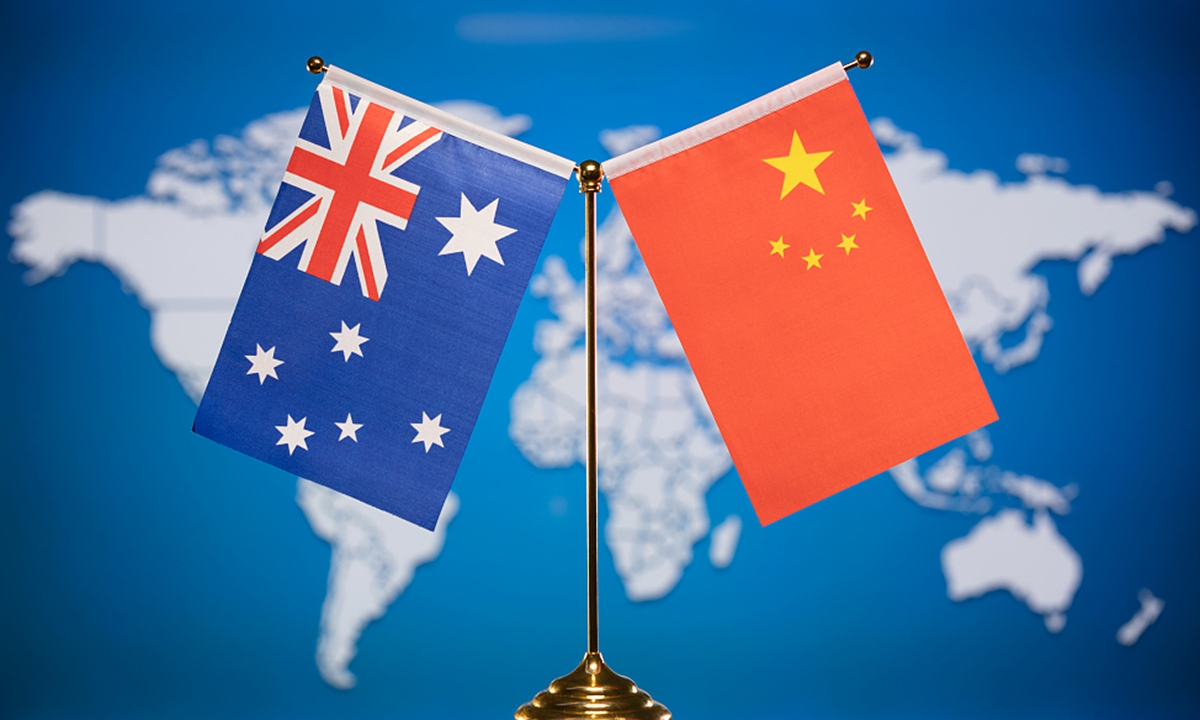Media and think tanks need to play more active and constructive role in impasse of China-Australia relations: scholars
Source: Global Times Published: 2020/12/13 23:44:43

China Australia. Photo: VCG
There are no historical disputes between China and Australia, and the two countries had very good official and non-governmental cooperation exchanges in the past, said scholars from both countries at a webinar on Thursday.
Australia needs to reflect on its provocations against China, and clearly recognize that in this impasse, hostile and biased reporting by some think tanks and media has deepened misunderstanding on both sides, scholars stressed at the webinar about the future of China-Australia Relations co-organized by Institute for a Community with Shared Future (ISCF) of Communication University of China (CUC) and University of Technology of Sydney.
Against the backdrop of strained China-Australia relations, more than 50 internationally renowned experts in the field of China-Australia relations and international communication from China and Australia attended the conference, where they called on academic institutions, media, and think tanks of both sides to strengthen dialogue and exchange.
The future for China and Australia need not be bleak, said James Laurenceson, director of the Australia-China Relations Institute at the University of Technology Sydney, noting that although there is some frictions between the two countries at the moment, Beijing and Canberra have still enjoyed sound cooperation across many sectors, and economic and trade relations between the two sides remain relatively resilient.
China is Australia's largest two-way trading partner in goods and services. According to the Australian Government Department of Foreign Affairs and Trade, in 2019, Australia's two-way trade with China stood at A$252 billion ($181 billion), accounting for 27.4 percent of Australia's total foreign trade, which was more than twofold of Australia's two-way trade with the US.
In the current turbulent political situation, the media and think tanks of both sides should pay attention to the objective facts, and avoid taking black-and-white positions and finger-pointing against each other, Laurenceson stressed.
"With the rise of emerging countries, the traditional, biased political values and institutional design of the West are no longer the universal standard of measurement. However, some Western scholars and think tanks still persist in blaming or even discrediting China with such self-serving values and assumptions," said Li Huailiang, professor of international cultural trade and the Dean of the ICSF.
Some Australian research institutes, especially the Australian Strategic Policy Institute (ASPI), have been keen on using unrelated satellite images as evidence for their claims of Xinjiang's "concentration camps," which have been debunked by both Chinese and foreign journalists. Li pointed out ASPI's review on Xinjiang issue was unsupported in evidence and based on lies.
"As a think tank, ASPI is not responsible and its imaginary report is harmful. All these practices, based on prejudice and arrogance, are not in line with the principle of diversity. These are also not in line with the interests of the peoples of the world," said Li.
Chen Hong, director of the Australian Studies Center at East China Normal University in Shanghai noted the "corrosive" role of some Australian media has also led to the rapid deterioration of China-Australia relations.
The Sydney Pioneer Morning Herald, The Melbourne Times and the Australian Broadcasting Corporation have presented one-sided anti-China tendencies and media narratives, fanning the China-threat theory, which has led to Australian people's misperceptions on China, Chen said.
Michael Keane, Professor of Chinese Media at Curtin University, stressed the importance of media as a public sector, saying that today's Chinese media outlets are more active and constructive than ever before, while Australian think tanks and mainstream media failed to provide the objective facts about China to the Australian people, playing a negative role in the development of China-Australia relations.
Greg McCarthy, an Adjunct Professor at the Australia-China Relations Institute of University of Technology Sydney expressed concerns about the spreading populism in Australia, proposing that China and Australia should strengthen communication and knowledge production in the fields of universities, think tanks and media, so as to narrow the gap in cognition between the two sides and increase mutual understanding in the other country.
At the seminar, scholars agreed and call for the media and think tanks should play the role of problem solvers rather than trouble makers in China-Australia relations, making scientific interpretations based on objective facts, rather than just acting as a callous mouthpiece for some politicians, and to truly contribute to the future of the two countries and the well-being of their peoples.
Posted in: POLITICS